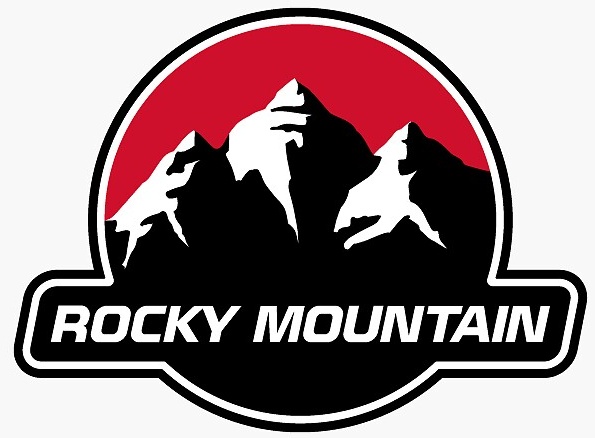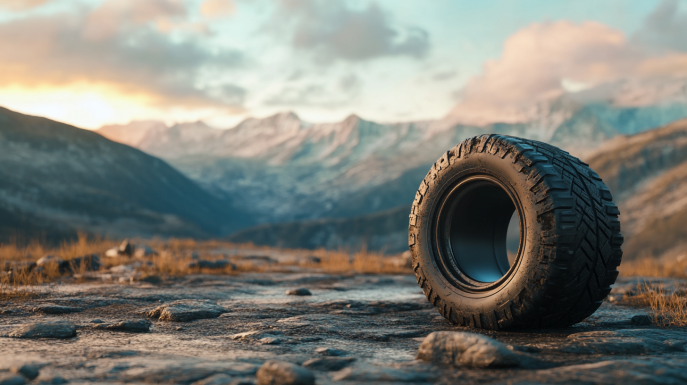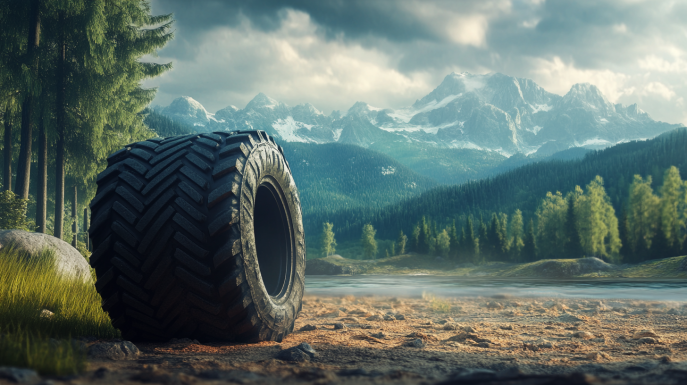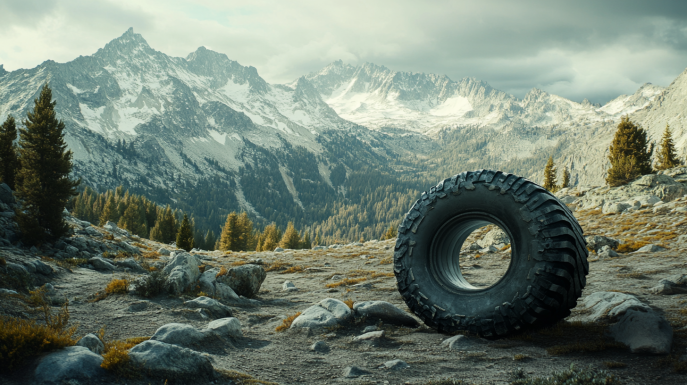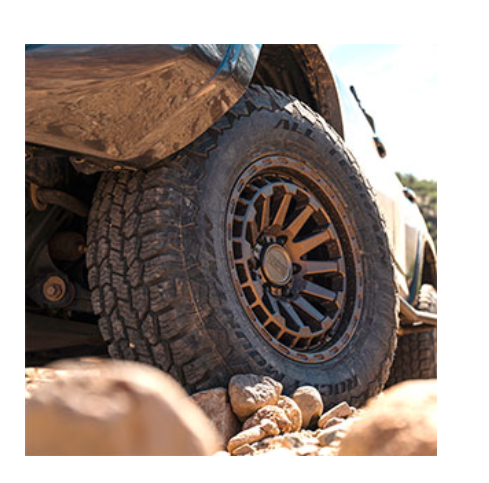
Rocky MountainAll Terrain
- Even treadwear is provided via the 5-rib lug design that provides greater surface contact.
- Multi-notched lugs add extra teeth to each open lug, yielding more traction and control in snow and mud.
Everything You Need to Know Before Getting Your Next Set of Rugged Tires
For drivers looking to take their vehicles off-road or deal with rough terrain, Rocky Mountain All Terrain Tires are an excellent choice to consider. Known for their rugged durability and all-weather traction, Rocky Mountain tires can take you places other tires only dream of.
But with so many options, sizes, and features available, choosing the right set of Rocky Mountain tires for your needs can be tricky. This comprehensive buying guide will walk you through everything you need to know before getting your next set of Rocky Mountain All Terrain Tires.
What Are Rocky Mountain All Terrain Tires?
Rocky Mountain Tires are specially designed off-road tires made to handle just about any terrain you throw at them. Their aggressive tread patterns and durable construction allow them to power through mud, rocks, sand, and anything else you encounter when going off-road.
Unlike all-season tires made for street driving, all-terrain tires are built to withstand punishment from off-road activities like rock crawling, mudding, overlanding, and driving on unpaved roads. They give you the traction and flotation needed to keep moving through rough conditions.
Some key features of Rocky Mountain All Terrain Tires include:
- Aggressive tread patterns – With large, irregular blocks and deep voids, the tread digs in and grips when off-roading.
- Tough sidewalls – Made of durable materials to prevent punctures and damage from debris.
- Reinforced construction – With features like stiff carcass plies and strong belts to handle impacts.
- Mud terrain variants – Some models have specialized mud terrain treads and oversized lugs for maximum traction in mud.
- Multi-purpose use – All-terrain means they can also handle occasional on-road driving as well.
How Do Rocky Mountain All Terrain Tires Perform Off-Road?
When you take your rig off-road, Rocky Mountain All Terrain Tires really shine. Here are some of the ways these tires excel in off-road environments:
- Traction in dirt and gravel – The aggressive treads and side lugs bite into loose surfaces, giving you forward momentum and control.
- Grip on rocks – The tread blocks and rubber compound allow the tires to conform to jagged rocks and maintain grip.
- Mud performance – Large, open voids prevent mud buildup while big lugs churn through sticky mud.
- Sand driving – With the ability to “float” across sandy terrain and resist getting bogged down.
- Snow and ice – Sipes and slots in the tread blocks give Rocky Mountain tires surprisingly good cold weather performance.
- Puncture resistance – Durable construction and materials reduce the likelihood of flats from sharp rocks or debris.
- Sidewall strength – Sturdy sidewalls resist curbing damage and avoid tread separation off-road.
For superior traction and flotation across practically any loose or uneven terrain, Rocky Mountain Tires deliver impressive off-road capabilities. Their specialized tread designs and rugged builds make easy work of surfaces that leave other tires spinning.
Where Can I Buy Rocky Mountain All Terrain Tires?
As a major tire brand known for off-road performance, Rocky Mountain Tires are carried by many national retailers and local installers. Here are some of the best places to buy your next set:
- Online retailers – Websites like TireRack.com and SimpleTire.com have excellent selections and prices on Rocky Mountain tires. You can easily compare models and even have them shipped to your door.
- Local tire shops – Nearby mechanics and installers may carry Rocky Mountain tires in stock or can special order them for you. This allows you to support local businesses.
- 4Wheel Parts – Major off-road part retailers like 4Wheel Parts are great options when looking for Rocky Mountain Tires. You’ll find knowledgeable staff and big selections.
- Automotive dealers – Some car, truck, and Jeep dealers may sell Rocky Mountain tires as upgrades when buying a new vehicle.
- Tire manufacturer websites – Check out the official Rocky Mountain Tire website for product details, authorized sellers, rebates, and promotions.
Shop around both online and locally to find Rocky Mountain All Terrain Tires at competitive pricing. And be sure to have them installed by experienced professionals.
Why Choose Rocky Mountain All Terrain Tires?
Rocky Mountain Tires have earned a strong reputation among off-roaders and overlanders for good reason. Here are some of the top advantages of choosing Rocky Mountain for your next set of all-terrain tires:
- Proven off-road performance – Their specialized tread designs tackle tough terrain and deliver impressive traction capabilities.
- Rugged durability – Made with durable materials and sturdy construction to handle rough off-road use.
- Quality engineering – They use innovative tread patterns and compounds developed through extensive R&D and testing.
- Trusted brand name – Rocky Mountain Tires have been around for decades and are a go-to choice for off-roaders.
- Good value – You get robust off-road performance at a more affordable price than premium tire brands.
- All-weather capability – Models with advanced tread compounds and sipes provide reliable grip in rain, snow, and ice.
- Coverage of sizes – Rocky Mountain tires come in a huge range of widths and diameters to fit most trucks, SUVs, and Jeeps.
For off-road enthusiasts wanting a dependable and rugged tire that won’t break the bank, Rocky Mountain All Terrain Tires are a top option to equip your rig.
What Features Do Rocky Mountain All Terrain Tires Have?
Key features and technologies that set Rocky Mountain All Terrain Tires apart include:
- Aggressive tread patterns – Irregular blocks, big lugs, and deep grooves provide off-road grip while shedding mud and debris.
- Sidewall protection – Thick rubber reinforced sidewalls resist punctures from off-road hazards.
- Sturdy carcass – Rigid inner layers use crisscross nylon or polyester cord plies to handle impacts.
- Cut/chip resistance – Tread rubber compounds resist chipping and cutting when driving over rocks or gravel.
- Multi-angle grooves – Angled tread grooves in different directions improve traction in dirt, mud, and snow.
- Stone ejectors – Small slits and notches in the tread blocks help eject rocks and debris from the rubber.
- Rim guards – Thick rubber padding on the sidewalls protect your wheel rims from dings and damage.
- Mileage warranty – Many models come with a mileage treadwear warranty of 50,000 miles or more.
The right combination of aggressive tread designs, durable construction, and traction-enhancing technologies make Rocky Mountain Tires ideal for tackling off-road terrain and obstacles.
Are Rocky Mountain All Terrain Tires Good for Snow?
While made primarily for off-road use, Rocky Mountain All Terrain Tires can also provide surprisingly good traction and mobility in moderate snow conditions. Features that improve snow and ice performance include:
- Sipes – Small cuts in the tread blocks increase the number of biting edges for grip on packed snow and ice.
- Staggered lugs – Offsetting or staggering the tread blocks limits noise on pavement but still allows the tires to shed snow effectively.
- Channel grooves – Deep, large grooves provide plenty of space for slush, snow, and water to escape from under the tires.
- Compound additives – Specialized rubber compounds maintain flexibility and grip down to freezing temperatures.
- Studdable models – Some Rocky Mountain tires have stud-ready tread designs if you want to insert studs for icy conditions.
While all-terrain tires lack the extreme snow and ice specialization of full winter tires, quality brands like Rocky Mountain give you enough snow capability for most regions outside of heavy winter climates.
How Durable Are Rocky Mountain All Terrain Tires?
One of the top selling points of Rocky Mountain Tires is their rugged durability and impressive treadlife. Here are some of the reasons these tires can tackle tough terrain while outlasting their competitors:
- Treadwear warranties – Most models come with treadwear warranties of 50,000 miles or more when properly maintained and rotated.
- Tread rubber compounds – They use advanced compounds to resist cutting, chipping, tearing and uneven wear.
- Multi-ply rated construction – With layers of stiff polyester or nylon cord plies to prevent punctures and increase resilience.
- Sidewall protection – Thick, wide tread blocks and rubber extend down the sidewall to protect from off-road debris.
- Rim guards – Added rubber padding around the wheel lip shields from dings and damage.
- Heavy load ratings – Rocky Mountain tires carry light truck and E-range load ratings to support heavier vehicles and loads.
- Quality manufacturing – They meet strict quality control standards in design and manufacturing for improved durability.
With their rugged build and reinforced materials, you can rely on Rocky Mountain All Terrain Tires to endure plenty of rough use while outperforming other value-tier brands.
What Sizes Are Available for Rocky Mountain All Terrain Tires?
One of the advantages of Rocky Mountain Tires is the wide range of sizes they offer to fit different trucks, Jeeps, and SUVs. Some of the most common sizes include:
- 33×12.5R15 LT – Fits older and smaller 4x4s, Jeep CJs, and light trucks.
- 235/75R15, 235/70R16 – Popular sizes for Jeep Wranglers, Cherokees, and pickups.
- 265/70R17, 265/75R16 – Great for trucks like the Toyota Tacoma, Nissan Frontier, and Chevy Colorado.
- 245/75R16, 265/70R17 – Perfect match for full-size pickups with 16 and 17 inch wheels.
- LT215/85R16, LT235/80R17 – Common flotation sizes for full-size pickups and SUVs.
- 35×12.5R17, 35×12.50R20 – For fitting larger lifted trucks and Jeeps.
- 40×13.5R17, 40×13.5R20 – The biggest sizes for heavily modified off-road rigs.
Rocky Mountain Tires range from smaller 15 inch tires all the way up to massive 40 inch behemoths. Check their fitment guide online to find the right size for your vehicle.
Are There Different Models of Rocky Mountain All Terrain Tires?
Rocky Mountain offers several lineup options when choosing All Terrain Tires to match your specific needs:
- Rock Claw MT2 – One of their most popular with balanced on/off-road traction.
- Rock Claw MTS – Specialized mud terrain version with maximum mud and sand performance.
- Rock Claw Radial ATX – Lower-priced model still offering solid all-around capability.
- Rock Claw X/T – Designed for lighter trucks with dependable highway manners.
- Rock Claw Winter Claw – Budget winter tire with decent snow and ice traction.
- Rock Claw All Country AT3 – Premier all-terrain with advanced treadlife and grip.
- Rock Claw Back Country AT – Deep lug mud terrain great for heavy off-road use.
Look for the model that fits your vehicle, priorities, and budget. The different Rocky Mountain lines have you covered for everything from winter driving to extreme rock crawling.
How Do Rocky Mountain All Terrain Tires Compare to Other Brands?
Rocky Mountain Tires compete with other popular value-oriented brands like Dick Cepek, Super Swamper, Atturo, and Mickey Thompson when it comes to all-terrain performance and pricing. Compared to premium brands, you can expect:
- Lower cost – Rocky Mountain tires are typically 15-20% less expensive for a given size.
- Shorter treadlife – Premium tires often have treadwear warranties 15-20k miles higher than Rocky Mountain’s 50-60k miles.
- Less winter traction – Brands like Toyo and Nitto optimize all-terrains more for snow and ice.
- More noise on pavement – There’s a tradeoff of on-road comfort for off-road grip.
- Not as smooth on highway – Rocky Mountain tires have stiffer construction and tread blocks less optimized for street driving.
For serious off-road use on a budget, Rocky Mountain All Terrains deliver impressive capability considering their reasonable price. Just don’t expect them to drive like a highway touring tire.
What is the Tread Pattern of Rocky Mountain All Terrain Tires?
The tread pattern of Rocky Mountain tires features an open, aggressive design ideal for off-road traction. Here are some key elements:
- Irregular tread blocks – Shapes and sizes are intentionally varied to provide different biting edges.
- Deep voids – Large open spaces between tread blocks allow debris and mud to escape.
- Sipes – Small cuts enhance flexibility and grip, especially in snow and ice.
- Staggered lug placement – Offsetting lug rows reduces noise on pavement while still providing lateral grip off-road.
- Center ribbing – Extra ribs down the middle of the tread helps minimize uneven wear when also driving on pavement.
- Stone ejectors – Small slits and notches to kick out rocks and gravel from the rubber.
- Rim guards – Thick protective rubber padding around the wheel lip.
The combination of these tread features allows Rocky Mountain Tires to power through various off-road conditions while still functioning on highways when needed.
How Much Do Rocky Mountain All Terrain Tires Cost?
A set of four Rocky Mountain All Terrain Tires will cost $400-800 on average depending on the model and size you choose. Here are some of the factors that affect overall tire price:
- Tire size – Larger tire diameters and widths are more expensive. For example, 35” tires can cost 2-3x more than stock sized tires.
- Construction type – Radial ply tires cost more than bias ply versions of the same size.
- Tread design – More aggressive mud terrain tires are generally more expensive than tamer all-terrain versions.
- Load range – Upgrading to a heavier load range with stronger plies means a higher price.
- Retailer – Online discount tire stores tend to have lower prices than local mechanic shops.
For a set of four 235/75R15 Rocky Mountain tires, expect to budget around $600 on average. Larger 35” off-road sizes will be $1000 or more.
Where Can I Find Reviews for Rocky Mountain All Terrain Tires?
Checking out customer reviews is recommended when researching different Rocky Mountain tire models. Some good sources of reviews include:
- Tire retailer sites – Large online sellers like TireRack and SimpleTire have customer reviews for the tires they stock.
- 4WheelParts – As a specialized off-road tire retailer, 4WheelParts has great reviews of how tires performed off-road.
- Manufacturer’s website – Rocky Mountain’s site includes customer reviews and ratings for their tire lines.
- Forums – Off-road and 4×4 forums like JeepForum have tire review threads with real customer experience and feedback.
- Youtube – There are many videos showing Rocky Mountain Tires in action during off-road testing and driving on different terrain.
- Reddit – Subreddits like /r/Offroad and /r/4×4 have discussions comparing different off-road tire brands.
Reading both expert tire reviews as well as actual customer experience provides the best insight on how Rocky Mountain Tires really perform on and off the road.
What Materials Are Used in Rocky Mountain All Terrain Tires?
Rocky Mountain utilizes a range of sturdy materials and components to give their All Terrain Tires rugged durability:
- Tread rubber compound – Made from a specialized blend of natural and synthetic rubbers to resist wear and enhance traction.
- Steel belts – Layers of steel cords underneath the tread reinforce the shape and prevent punctures.
- Polyester and nylon cord plies – Crisscross layers made of durable synthetic fabrics to strengthen the sidewalls and stabilize the foundation.
- Rim cushions – Thick rubber padding on the wheel lip prevents damage during off-road driving.
- Sidewall rubber – The compound used in the sidewalls resists cracking and withstands off-road hazards.
- Bead wire – High tensile steel wire encased in the bead helps lock the tire securely to your wheel’s rim.
The combination of advanced rubber compounds, durable synthetic fabrics, and protective steel components allows Rocky Mountain Tires to take punishment without failure.
How Are Rocky Mountain All Terrain Tires for Highway Driving?
While optimized for off-road durability and traction, Rocky Mountain Tires can still work surprisingly well for regular highway use if needed. Features that improve their on-road manners include:
- All-season tread compounds – Provide decent grip on paved roads in dry and wet conditions. Just not as optimized as highway specific tires.
- Closer tread blocks – The blocks are tighter and less aggressive at the tire shoulder for improved handling.
- Stabilizing belts – The steel belts underneath the tread keep the tire stable at higher speeds.
- Load ratings – Meet requirements for carrying heavier vehicles at highway speeds.
- Circumferential grooves – Grooves around the circumference help reduce hydroplaning on wet pavement.
- Sipe tread cuts – For better grip from the higher number of biting edges on pavement.
While best suited for off-road, Rocky Mountain Tires will get the job done for mixed use drivers who split time between highways and dirt. Just don’t expect the same comfortable, quiet ride as your average all-season highway tire. The tradeoff is unmatched off-road performance.
Are There Warranties for Rocky Mountain All Terrain Tires?
Rocky Mountain provides the following standard warranties when you buy a set of new Rocky Mountain tires:
- Mileage/treadwear warranty – Covers premature treadwear under normal driving conditions. Duration and mileage varies by specific tire line – typically around 50,000 miles.
- Materials and workmanship – Covers defects in materials or how the tire was manufactured. Typically warranted for 5 years from purchase date.
- Road hazard protection – Protects against tire damage from road hazards like potholes, debris, etc. Usually 1-2 years of coverage.
- 30 day ride guarantee – Full refund or replacement if unsatisfied with how the tires perform in the first 30 days.
Be sure to check the manufacturer’s website for full warranty terms and exclusions. For defects falling under warranty, Rocky Mountain will provide free repair or prorated replacement cost. The warranties give you peace of mind that your investment is protected.
How Do You Maintain Rocky Mountain All Terrain Tires?
Here are a few tips for getting the longest life and performance out of your Rocky Mountain Tires:
- Rotate tires every 6,000-8,000 miles – This evens out tread wear by changing each tire’s positioning. Follow a crossing rotation pattern.
- Check tire pressures monthly – Running at the proper inflation pressure extends treadlife and prevents uneven wear. Use an accurate gauge.
- Inspect tires periodically – Look for abnormal or uneven tread wear, cuts, bulges, nails, or aging cracks. Catch issues early.
- Get alignments if needed – Misalignment causes abnormal wear. Get an alignment after a suspension lift or if you notice wear on the edges.
- Clean treads – Remove mud and debris regularly to prevent buildup in the tread voids. Use a stiff brush and rinse off.
- Store out of sunlight – Limit exposure to UV rays which can dry out and crack the rubber over time.
With periodic maintenance and care, Rocky Mountain Tires will deliver durability to match their tough reputation.
What Makes Rocky Mountain All Terrain Tires Unique?
Some of the unique qualities that set Rocky Mountain Tires apart in the all-terrain category include:
- Surprisingly good snow traction – Thanks to sipes, staggered lugs, and open tread designs. Gives you decent winter capability without swapping out tires.
- Specialized mud terrain variants – Lines like the Back Country MT have some of the most aggressive mud performance in their price range.
- Excellent value pricing – Rocky Mountain tires offer impressive off-road traction and durability at more budget-friendly prices compared to premium brands.
- Array of sizes – From skinny 15″ tires to mega 40″ tires, they have you covered for practically any off-road vehicle.
- Made in the USA – Unlike many value tire brands, Rocky Mountain still manufactures most of their tires domestically in the US.
- Brand heritage – The company has satisfied off-roaders with durable, affordable tires since the 1980s.
For off-road enthusiasts wanting time-tested performance on a budget, Rocky Mountain Tires bring the right blend of proven reputation, specialized tread designs, and reasonable prices.
How Do Rocky Mountain All Terrain Tires Handle in Mud?
With deep-lugged tread patterns and large voids, Rocky Mountain Tires are specially designed to power through muddy conditions. Here’s how they tackle deep mud:
- Self-cleaning tread – The irregular blocks and big openings allow mud to clear out as you drive without packing in and clogging.
- Deep biting lugs – The prominent lugs extend to dig in through thick, sticky mud down to firmer traction underneath.
- Reinforced sidewalls – Thicker rubber coverage and durable compounds resist mud scuffs and tears.
- Mud specific models – Lines like the Back Country M/T have ultra aggressive mud tread designs with tiered lug blocks.
- Wide and tall sizing – Mud terrain tires typically come in oversized widths and aspect ratios for flotation.
- Rim guards – The additional sidewall rubber protects wheels from mud and impacts with terrain.
Thanks to optimized mud tread patterns and robust construction, Rocky Mountain Tires will keep you moving through the deepest, stickiest mud pits.
Are Rocky Mountain All Terrain Tires Suitable for Towing?
While not their main purpose, Rocky Mountain All Terrain Tires can work for light to moderate towing duties thanks to these qualities:
- Durable construction – The sturdy materials and plies give them the strength to handle heavier loads.
- Load Range E rating – Typical of truck tires, Rocky Mountain tires meet this weight rating for towing capacity.
- Good wet weather grip – Important for maintaining control and stopping power when towing in the rain.
- Responsive handling – The steadier on-road feel provides more stable towing performance.
- Heat resistance – They can withstand the buildup of heat from towing heavy over long distances or grades.
- Proper sizing – Make sure to get the load rating and size matched to your tow vehicle’s needs.
While specialized towing tires would be better suited for frequent heavy towing, Rocky Mountain All Terrains offer a capable option if you only tow lighter loads occasionally. Just don’t expect luxury car ride quality.
Key Takeaways on Buying Rocky Mountain All Terrain Tires
For truck, Jeep and SUV owners wanting to upgrade to more rugged, off-road focused tires, Rocky Mountain All Terrains provide an excellent choice combining impressive traction, durability, and value pricing.
- Assess your priorities between off-road performance, on-road comfort, and all-season capabilities.
- Choose the right tire model and size to match how you’ll use your vehicle. Consider mud terrain or studdable tires for extreme use.
- Turn to online tire retailers and specialty off-road stores to get the best deals on Rocky Mountain tires.
- Carefully maintain and store your tires to maximize treadlife out of your investment.
With expertise engineering off-road tires since the 1980s, Rocky Mountain builds some of the toughest all-terrain treads to rely on when you need traction in unpredictable terrain and conditions. Their specialized tread patterns and durable construction will give you confidence to take your 4×4 rig to places others only dream of.
